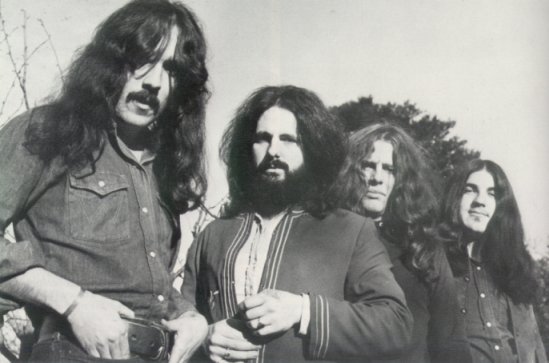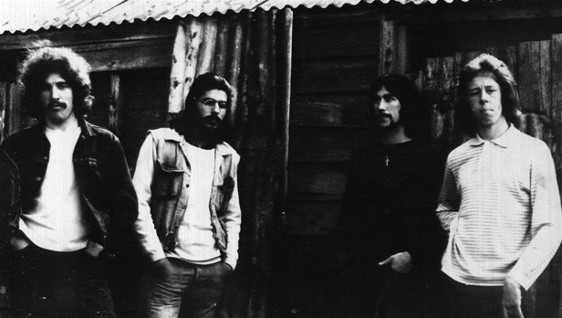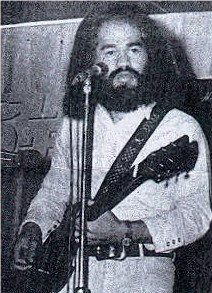Gleanings from Rock from the Edge by Keith Newman (add your memories?)

By Keith Newman
In New Zealand in the mid-60s resident nightclub and touring bands were developing their own distinctive hard-edged rock guitar-based sound based around international influences and their own experimentation. Bands including Human Instinct with guitarist Billy T. K, Jigsaw featuring Chas Bourke Kennedy, Ticket with Eddie Hansen, The Underdogs with Harvey Mann and The Brew featuring Doug Jerebine competed for the crowds and much of the attention was on the axemen.
Underdogs guitarist Harvey Mann was
considered guitar supremo. He continued to refine his already accomplished
style and technique working alongside Doug Jerebine in the last days of The
Brew. The Underdogs and Human Instinct pushed each other to cult status,
however the Human
Instinct were the first to record an album in 1969 with guitarist Billy T. K
exhibiting a wild contemporary bluesy style in the tradition of Hendrix. Human Instinct went on a three month working trip to London before returning to New
Zealand to record their first album Burning Up Years in 1969 which was followed
up by Stoned Guitar in 1970 and Pins In It in 1971.
Seven of the songs on those first two albums were written by a
guitarist who called himself Jesse Harper. Among them was Midnight Sun, the Jug-a-jug
Song and Hear the Good News. Jesse Harper was in fact Doug
Jerebine who had
become an important contact for Human Instinct during their brief stint in
London.
The Brew
featuring Doug Jerebine had been one of Auckland’s first underground bands
and formed by saxophonist Bob Gillett originally from Santa Anna, California.
His experience included playing jazz gigs
in big bands during the Second World War and touring with Stan Kenton and
Anita O’Day, Frank Sinatra, Sara Vaughan, Billie Holliday and Ella
FitzGerald in the 1950s. He came to New Zealand
around 1960 after studying classical composition with some of the masters of
the era . Arriving in Auckland he landed the job conducting and composing
for New Zealand
Broadcasting Service (NZBS) radio band and ultimately decided to form his
own band to play a new kind of music. His first recruit was guitarist Doug Jerebine who
was fond of experimenting with equipment and sounds.
 The band brewed up and
served an outrageous mixture of jazz, rock and funk. Gillett was drawn to Indian
philosophy and encouraged Jerebine to follow suit. Jerebine was caught up in a new world
where he learned tabla and sitar. When the band dissolved Jerebine moved on to the UK
where he met up with the Human Instinct and provided major inspiration for
their forthcoming albums before taking a group of musicians to Holland. He
became a high ranking krishna monk, disappearing for many years, keeping
contact with only a few selected friends. A more detailed outline of the
Jesse Harper Legend (Doug Jerebine
story), a condensed excerpt from Rock From the Edge by
Keith Newman, has now been included on this site, along with new
photographs.
The band brewed up and
served an outrageous mixture of jazz, rock and funk. Gillett was drawn to Indian
philosophy and encouraged Jerebine to follow suit. Jerebine was caught up in a new world
where he learned tabla and sitar. When the band dissolved Jerebine moved on to the UK
where he met up with the Human Instinct and provided major inspiration for
their forthcoming albums before taking a group of musicians to Holland. He
became a high ranking krishna monk, disappearing for many years, keeping
contact with only a few selected friends. A more detailed outline of the
Jesse Harper Legend (Doug Jerebine
story), a condensed excerpt from Rock From the Edge by
Keith Newman, has now been included on this site, along with new
photographs.
Gillett produced The Underdogs album Wasting My Time featuring
Harvey Mann on guitar, Glen Absalom on guitar and Neil Edwards on bass.
Edwards moved on to join Human Instinct in 1972, Mann and Absalom joined
with bass player Billy Williams to form Space Farm which
released one album of guitar-driven anthems in album on Zodiac in 1972
which in its later release on the Germany Little wing label became known
as Going Back to Eternity. The band drew strong crowds keen to
see the tight trio and the spectacle of Mann doing his thing at the
forefront of the underground scene. Mann however had begun to look
deeper into music and the social habits of being a musicians and his
interest in Eastern philosophy resulted in abstinence from the
substances that often fuelled the rock 'n roll lifestyle and a pull
toward the Krishna
Consciousness movement. Music was still the driving force and after a
break the next expression for both Mann and Absalom along with friend
Eddie Hansen who had recently ended his founding roll in progressive
rock unit Ticket for similar lifestyle reasons.
But by the end of 1974, Hansen had gone to Sydney to join former La De Das guitarist and vocalist Phil Key in Band of LIght with Billy Williams and Danny Davidson but six months later was back in Christchurch with Williams and Davidson and former Ticket vocalist Trevor Tombleson for a three month stint as Sky Pilot. Meanwhile Harvey Mann had been looking around for likeminded musicians to form a new unit. By mid-1975 the band had a name and a prestigious line-up. Living Force was Murray Partridge on guitar and vocals who been with blues band Freshwater and had some success in Australia, Ivan Thompson a founding member of Dragon on (keyboards?) and Gary Clarke who'd been in Carson (?). Their debut gig was at Maurice Greer's Croft's nightclub in Auckland. Only months later Partridge was replaced by Eddie Hansen.
With two of the country's most proficient guitarists on-board the audience had expectations of what the sound might be delivered but many were disappointed. this wasn't your average progrock band, the sounds were mellifluous and drawn out with extended solos and rambling themes, most often related to their new spiritual walk, and specifically Krishna focused.
According to John Dix in Stranded
in Paradise, Radio
Hauraki had organised a concert in Auckland's Albert Park. and booked
Living Force as one of the acts. After they had meandered along for over
half an hour on one song, 90 percent of the 2000 strong crowd decided to
leave. All that was left were the jubilant Krishna devotees. The boys in
the band didn't seem to notice. Thirty minutes after the scheduled
completion time for the concert, they showed no signs of finishing, so
the power was cut off. The band staggered on until the mid-1970s
with one classic and now very rare album to their name before they
dissolved and went their separate ways. Band members dispute this
account.

Instinct
to Powerhouse
After three years and three albums delivering electrifying riffs as part
of cult progrock trio Human Instinct, Billy T.K was ready to explore
more melodic themes. Powerhouse experimented with Latin-tinged blues and
funk rhythms with lush layers of vocal harmonies, brass and percussion
all woven together with Billy’s relentless but unmistakeable riffs and
extended solos. Billy T.K
& Powerhouse even went into the studios with EMI in 12972 and
produced an album's worth of material that seemed to disappear into the
ether until I happened to ask an engineer at EMI if the tapes were still
around. Sure enough he soon spotted the lost treasure and Grant
Gillanders, an independent contractor who's put together a lot of 60s
and 70s compilations did all the leg work to ensure it got released...
Photographs:
Ticket 1972 (left to right) Eddie Hansen, guitar, Trevor
Tombleson on vocals and percussion, Ricky Ball drums and Paul Woolright
on bass
Early Underdogs. Left to right: Doug Thomas, Lou Rawnsley, Murray
Grindlay and Harvey Mann. Billy T.K in the early 70s (Gillanders)
Jogging
the memory?
An
invitation to add your comments in relation to the music and club scene,
in particular related to specific bands who were of the ‘underground’,
progressive or rock genre from the 60s and 70s. Invitations from ex-pat
Kiwi to contribute as well, particularly if they witness Kiwi rockers in
actions offshore or were part of a unit that had a successful or even
fading career beyond Kiwi shores.
Stebbings memories (2007)
Chris Martin who worked at Stebbings at the time recalls the first
official Split Ends (later changed to Split Enz) recording was a jingle
for Suzuki Motorcycles, "Let Suzuki blow your mind" (MacHarman
Advertising owned by one Bob Harvey). It was a 30 second jingle which
ended with the sound of a 750cc three cylinder, water-cooled, two-stroke
Suzuki accelerating away into the distance (recorded in the little dead
end street behind Stebbings studio in Herne Bay.
Human Instincts "The Hustler" was also recorded in Stebbings with
Maurice Greer on drums. Glen Mikkelson who played bass says, "Maurice was an
incredibly loud drummer whose sound, despite the excellent sound
absorbing qualities of Eldred Stebbing's studio, would leak over into
Studio Two where voiceovers were being recorded for radio ads."
![]() Add your 15 seconds of fading memories to the list????
Email me
your take on the time: Keith Newman
wordman@wordworx.co.nz. Even better attach a photograph if you have
one. You never know it could be a valuable contribution to a future
article or even be part of the book that I’ve been working on for years.
Add your 15 seconds of fading memories to the list????
Email me
your take on the time: Keith Newman
wordman@wordworx.co.nz. Even better attach a photograph if you have
one. You never know it could be a valuable contribution to a future
article or even be part of the book that I’ve been working on for years.